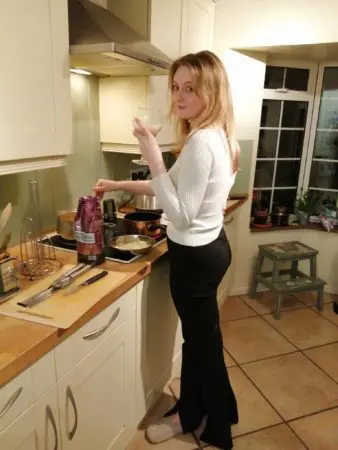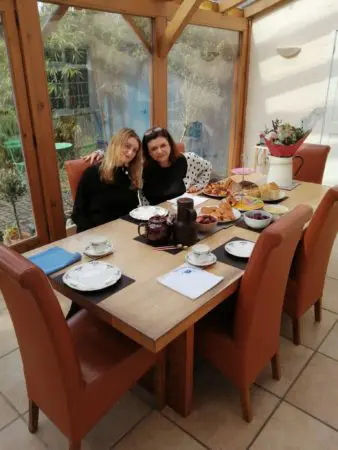Megan’s story: “I walked in the room and I knew there was something wrong”
“I remember my body shaking with the nervousness and the panic… I was told to come downstairs, I walked in the room and I knew there was something wrong from everyone’s mood”
Megan had been experiencing stomach pain that got progressively worse over the course of six months before being diagnosed with gastric malt lymphoma in August 2020.
The 17-year-old had to describe her symptoms over the phone because face-to-face consultations were impossible due to the pandemic.
With a history of Crohn’s disease in her family, Megan suspected she might have something similar.
She said: “I had some blood tests done to see what was going on and it was found that I was really anaemic which had been happening for quite a long time. I got called into the doctors to see them in person and from there tests were arranged like scans.
“I was experiencing stomach pain, which – I didn’t know at the time – was ulceration in my stomach, a lot of that pain I’d get when I was sleeping at night.
“But then later on when I progressed to get a lot more ill and I couldn’t sleep at night because of the pain and I wouldn’t be able to eat as much because certain foods would irritate it.
“I was vomiting coffee ground vomit and after that happened I had to go into hospital for a week and a half to do tests, so it had progressed.”
Megan received a diagnosis over the phone, in August 2020, six months after first flagging her symptoms.
She said: “It definitely was hard because I think I was processing the fact it could be Crohn’s and the implications that would have on my life and then when you’re told it’s something different but seemingly more serious and scary, that definitely plays on your mind a lot.
“When you’re told over the phone it’s harder to gauge the situation because you can’t see people’s expressions. But in the circumstances it was in, in the pandemic, I still got the best help at the time that I could with the consultant explaining everything to me.
“I remember my body shaking with the nervousness and the panic and I just remember, because my Dad picked up the phone before I did and he was told about what I had vaguely. I was told to come downstairs, I walked in the room and I knew there was something wrong from everyone’s mood.”
Megan began an antibiotic treatment straight away but the cancer did not respond and she was told she needed chemotherapy and immunotherapy.
She said: “That was in December, it was a couple of days before Christmas. It was definitely a hard thing to hear, because you feel like that’s the time of year when you’re supposed to be happy and you’re trying to be happy but it’s difficult with the circumstances when you feel like you have no control over your life anymore.
“There was the possibility that the treatment I was going to do was going to damage my fertility potentially or put me into early menopause.
“I took a few days to process that and make a decision on it but felt like for me at the time it would have been too much on top of starting treatment and if I did go down the IVF route it would delay my treatment. I wanted to get the treatment out the way and get on the path to recovery so I decided to take the risk with that.
“I feel like you just don’t know what you want in the future so it’s a difficult and not nice decision to make.”
Megan’s chemotherapy was in the form of tablets which meant she had to spend less time in hospital. Although the side effects were tiredness and headaches she was able to continue studying and gained a pace at university to study medicine.
She said: “I coped with that quite well. I used to go into hospital every month to do my rituximab treatment, so that was an injection into my stomach that I was given and that helped the chemotherapy work better.
“I was doing my A levels at the time so it was quite a stressful environment anyway. I feel like it was a difficult process to go through because you’re stressed about cancer and all the feelings surrounding that and then you’ve got this other world where you’re stressed about getting the grades for your university place and sorting that out but I did also find it a way to cope with my diagnosis because I always had something to focus on. It takes your mind off the other stuff you’re going through.
“When I was going in for my treatment, I was allowed one of my family members with me which was good because the first time doing the rituximab treatment was quite daunting because you read all the potential side effects and it can be quite overwhelming.”
Megan had the support of her family throughout her treatment, but says that her cancer diagnosis affected everyone around her.
She said: “It did have an impact on our family, especially at Christmas because you’re trying to keep things going and keep the mood up but everyone collectively felt quite down and it was a hard time with the pandemic anyway.
“The New Year is supposed to bring a fresh start but it just felt like it wasn’t starting the New Year right having to start the treatment. The whole thing loomed over Christmas so it wasn’t the best.
“Christmas 2021 was a bit different because I had started a job at the hospital as a healthcare assistant in my gap year so I was working over Christmas.
“I feel like even though I haven’t got the best memories over the past year of being in hospital it’s also somewhere that has really helped me get back on track with my life, so I find it quite a positive environment to be in and I like the teamwork with everyone working together in the healthcare profession. You’re there to help the patients that unfortunately aren’t able to be with their families and have to be in hospital and you’re working together with that collective goal.”
Megan, who is now in remission, was grateful for the support she received from Young Lives vs Cancer, through her social worker Julia.
She said: “Julia was really helpful with the emotional side effects of the cancer and if I needed someone to chat to about the things that I was feeling.
“My nearest hospital is Salisbury but I got transferred to Southampton so it’s about 40 minutes away. I did get offered a grant to cover travelling and parking tickets so that was useful.
“At the end of my treatment, I had a zoom consultation with Julia and one of the nurses, Paul, who was involved in my care and we went through discussing different categories of my life like friendships, school and university and how I was feeling about all of those things during my treatment and just talking about the future.
“You feel like after treatment it will just be this big relief and you’ll just feel a lot better but it’s a gradual thing over time before you start to feel better. After treatment I felt a bit more low because I did all that and then realised what I’d been through and I felt different to the rest of my age group. It was a gradual thing of starting to come back to feeling myself again.”
Posted on Monday 17 January 2022





